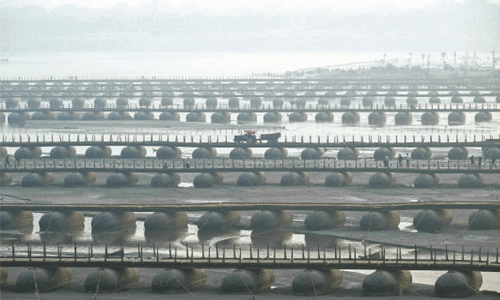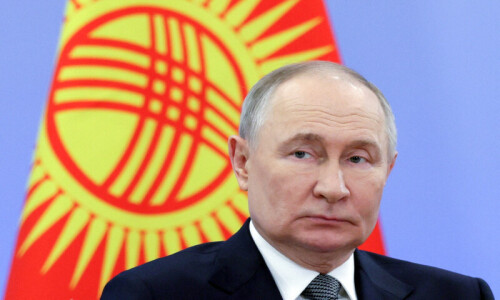BACK in 2017, a civilian leader’s relations with his military’s top generals started to crumble. The US president had just returned from overseas with a bright idea: his country ought to have a military parade. It was to be a spectacular display of power on the 4th of July. Tanks rolling through the streets of Washington, D.C. Fighter jets painting the sky red, white and blue. Military bands serenading crowds of overjoyed patriots. President Trump called in his defence secretary, laid out his ideas like an excited schoolboy, and asked, “so what do you think?”. Retired Lt Gen James Mattis’s response was less than encouraging: “I’d rather swallow acid.”
A 2022 report by the New Yorker described in detail what happened next. After the defence secretary reacted with disgust at the thought of spending millions of taxpayer funds on self-promotion, Trump changed plans. He called a meeting with the vice chairman of the joint chiefs of staff, Gen Paul Selva (who was to oversee the parade) and repeated the pitch.
It would have been easy for Gen Selva to tell his boss what he wanted to hear. Instead, he told the truth. “I grew up in Portugal. [It] was a dictatorship — and parades were about showing the people who had the guns. In this country, we don’t do that. It’s not who we are.” Trump still didn’t take the hint. “So, you don’t like the idea?” “No,” said Selva. “It’s what dictators do.”
Meanwhile in Pakistan, we don’t just have one big parade to show who’s got the guns. We have hundreds of little ones every day, just in case you forget. You’ve probably seen what I’m talking about. Odds are, you have found yourself stuck in traffic, or halted by a police officer. You sat back, waited, and eventually watched a convoy of large vehicles with blacked-out windows speed through the newly emptied street, surrounded by pick-ups full of men with guns.
It’s not about security. It never has been.
Living in Islamabad, I often see it multiple times a day. Every time, I’m reminded of a scene in Mohammed Hanif’s debut novel that described Gen Zia’s protocol. It didn’t make any assertions, simply describing in detail all the people waiting at an intersection for his lordship to move along. For an entire page, Hanif speaks of the bikers, the businessmen, the students, the immigrants, the doctors, the drug addicts, and everyone else stuck in traffic, hearts bursting with anxiety. They are vastly diverse, but with similar questions: “Which one of our many rulers is this? If his security is so important, why don’t they just lock him up in the Army House?”
Judging by the amount of ‘protocols’ you see on Islamabad’s streets today, one can assume that the number of our rulers has increased since Zia. This isn’t to imply that security is a bad thing. Of course, some people are at a higher risk than others, and it’s the state’s responsibility to protect them. But there are obvious questions that any free country would be crazy not to ask itself — like what is accomplished by four Vigos full of gunmen that isn’t by one? What is accomplished by half a dozen guards in a police escort that isn’t by one guy in his excellency’s back seat? Spoiler alert: it’s not about security. It never has been.
At the heart of protocol culture is the desire for respect. Not just grounded in admiration, but specifically, in fear. In Pakistan, it seems to have become an explicit symbol to separate the haves and the have-nots. Maybe, that’s why every time a property tycoon suddenly finds himself with more money than he knows what to do with, the first thing he’ll buy is a black Vigo to follow his Land Cruiser, replicating the grandeur of taxpayer-funded importance.
The other day I was stuck in traffic with a friend who proposed an alternative point of view: this security is only given to those at the highest echelons of government. They’ve worked for decades to reach this point. Now that they’re at the top, protocol is like a guard of honour. When regular people see this, they’ll be inspired to work hard for their country to reach this level of respect — why take that away from them?
What I find most fascinating about this take is that when some people close their eyes and think of the epitome of success, they don’t think of a loving family, a comfortable retirement, or the warm, fuzzy feeling of having left the world better than how they found it. They think of large vehicles filled with armed guards following them around, shouting at people to get out of the way.
But of course, dear reader, you might agree with that friend more than you agree with me. So, I’ll tell you the same thing I told him: anyone is entitled to their weird fantasies. While the reasons for their existence could be better explained by a psychologist, all I can say is that I won’t judge you for it. If you dream of one day exerting power and superiority over your fellow citizens, that’s on you.
But if you ask me, I’d rather swallow acid.
The writer is a lawyer and columnist from Okara, based in Islamabad.
Twitter: @hkwattoo1
Published in Dawn, December 11th, 2022














































